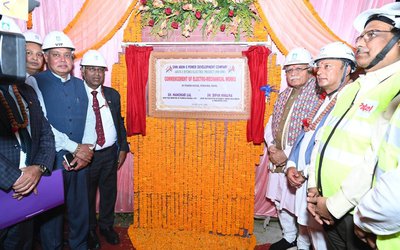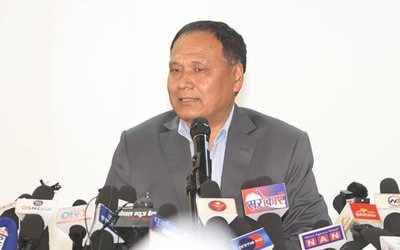
Even a week after the revision of monetary policy, which readjusted the interest rates in shares and real estate, by Nepal Rastra Bank (NRB), the market has not responded as expected. Despite a three-digit jump in the share market, it has again declined.
Similarly, although there has been an adjustment in real estate investment, the impact on the market is yet to be seen. The Nepal Rastra Bank (NRB) has made adjustments to the bank rate and policy rate during its first quarterly review of the monetary policy for Fiscal Year 2023/24, which took place from mid-July to mid-October.
The Nepal Rastra Bank (NRB) has made adjustments to the bank rate and policy rate during its first quarterly review of the monetary policy for Fiscal Year 2023/24, which took place from mid-July to mid-October. In its review, the NRB demonstrated flexibility by reducing both rates. The bank rate was lowered from 7.5% to 7%, while the policy rate was reduced from 6.5% to 5.5%.
The bank rate is the interest rate that the central bank charges to banks and financial institutions to influence the base rate of the BFIs. Similarly, the policy rate is a short-term interest rate that a bank charges when lending to other banks.
The Governor of the Nepal Rastra Bank, Mahaprasad Adhikari, stated that the first quarter review of the monetary policy for the current fiscal year is based on several factors, including current inflation, the balance of payments, and the growth rate of bank loans for the private sector.
The Governor of the Nepal Rastra Bank, Mahaprasad Adhikari, stated that the first quarter review of the monetary policy for the current fiscal year is based on several factors, including current inflation, the balance of payments, and the growth rate of bank loans for the private sector. The Nepal Rastra Bank (NRB) has implemented policies to facilitate loan expansion and business continuity for reliable borrowers.
Adhikari stated that the NRB will take strict action against debtors who do not repay their loans, while those who are genuinely struggling will be assisted with loan restructuring.
During a press conference held to discuss the quarterly policy review, the Governor announced that the NRB has been asked to disclose internal remittance information. After conducting a study, the central bank will set a limit on transaction amounts.
The Nepal Rastra Bank (NRB) has reduced the bank rate and policy rate after analyzing various factors that affect inflation, balance of payments, and private sector bank loan growth rates.
Additionally, the interest rate on bid-collected deposits has been lowered from 4.5% to 3%. The NRB has initiated this interest rate reduction, as stated in its review.
The NRB has announced that the mandatory cash reserve ratio and statutory liquidity ratio will remain unchanged.
Additionally, the risk weightage of large loans going to securities has been reduced. The risk weightage of share mortgage loans above Rs. 5 million has been lowered from 150 per cent to 125 per cent.
Share mortgage loans below Rs. 5 million will maintain a risk weightage of 100 per cent. The aim of the monetary policy review was to increase the viability of the stock market by reducing the risk weightage in share mortgage loans.
Additionally, the risk weightage for real estate loans exceeding Rs. 5 million has been reduced to 125 percent. Previously, the risk weightage for real estate loans exceeding Rs. 5 million was 150 percent.
Low-interest rates to build earthquake-damaged houses
The Nepal Rastra Bank (NRB) has made a provision to provide loans at a subsidized interest rate for the reconstruction of residential houses that were damaged by the earthquake on November 3, 2023, in Jajarkot and Rukum West districts.
Similarly, for the reconstruction of public schools, public hospitals, and health posts damaged by the earthquake, banks and financial institutions can contribute up to 40% of the amount to be spent separately to the corporate social responsibility fund from the profits of the fiscal year 2022/23 and 2023/24.
Additionally, the NRB has arranged that 50% of debentures issued by banks and financial institutions can be counted as resources until mid-July 2024.
"The Nepal Rastra Bank (NRB) stated that debentures issued by banks and financial institutions can be counted as resources at 100% until mid-January 2024. After this date, 50% of the debentures will be counted as resources until mid-July 2024."
The NRB also allows borrowers with problems to restructure their loans.
The NRB has announced that it will improve the effectiveness of actions taken against borrowers who deliberately default on their loans in the banking and financial sectors.
This will allow for loan restructuring and rescheduling to assist borrowers who are facing difficulties due to circumstances beyond their control. Additionally, a policy has been adopted to assist borrowers who are in regular contact with microfinance financial institutions (MFIs) but are unable to continue paying their loans due to various circumstances.
The NRB has announced that borrowers who submit an application to the MFIs for loan restructuring by April 12, 2024, will have their loans restructured.

Meanwhile, Chandra Prasad Dhakal, President of the Federation of Nepalese Chambers of Commerce and Industry, stated that the first quarter review of the monetary policy, which was made public by the Nepal Rastra Bank on Friday, will boost investor morale to some extent and aid in the recovery of the economy.
Dhakal also noted that the review of the monetary policy showed flexibility in bank rates, policy rates, loan restructuring, and house and share loans. We have been consistently raising these issues for an extended period. The central bank has taken these issues into account. This can boost investor morale and encourage investment,” he stated.
“On behalf of the private sector, the FNCCI has repeatedly urged the Nepal Rastra Bank to make special arrangements in the monetary policy to bring the economy back on track. Now, our demands have been met. How much will the latest provision contribute to bringing the economy back to normal? He said, 'That remains to be seen.'
Due to Nepal's fragile economic indicators, there is widespread fear of another economic recession due to investment in unproductive real estate.
- NEPAL-THAILAND: Joint Business Council
- Apr 13, 2025
- BIMSTEC SUMMIT: Nepal’s Stand
- Apr 11, 2025
- IME GROUP: Expands Into Paper Industry
- Mar 24, 2025
- CPN UML: Instigated By India
- Mar 23, 2025
- ADB’S CHIEF ECONOMIST: Nepal Reduces Poverty
- Mar 11, 2025















